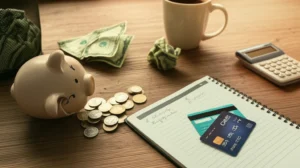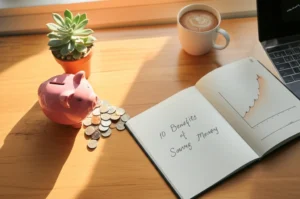Where Does It All Go?
What if you could wave a magic wand and, poof, your money stopped disappearing every time your allowance or stipend hits your bank? Yeah… I’ve wondered that too. More times than I’d like to admit. But listen: Even if it feels like your cash just grows wings and flies off—there’s usually a pattern behind it. The “financial habits of students essay” isn’t just some dry assignment; it’s basically a mirror for all those “Oops, did I really need ten oat milk lattes this week?” moments.
Have you ever opened your banking app and just… stared? Wondering how on earth snacks, energy drinks, “study breaks” (a.k.a. online shopping), and random app subscriptions manage to evaporate half your funds by week two? Turns out, you’re not alone. research on spending habits shows nearly half of students burn through most of their allowance on food—especially snacks and drinks. The runner-up for “budget killer”? Clothes and accessories. And then comes entertainment—movies, streaming, gaming, the whole deal.
Is Peer Pressure Messing With Your Wallet?
We’ve all been there: Your roommate buys new headphones. Next thing you know, yours “stop working”… or “just don’t sound the same.” Peer pressure is real. Social feeds are full of must-haves. Group purchases, “treat yourself” urges, and FOMO sales all sneak dollars out of your pocket without warning. I’ve absolutely blown my budget joining spur-of-the-moment pizza runs and justifying it as “networking.” Sound familiar?
Impulse vs. Intention: A Quick Look
| Impulse | Smarter Swap | What You Save |
|---|---|---|
| Daily coffee shop stops | DIY morning coffee | $80+ per month |
| Full-price textbooks | Used or rented books | $200+ per semester |
| Takeout for lunch | Packing leftovers | $150+ per month |
(I wish someone had shown me this table during my first semester. Packing food isn’t glamorous… but getting to splurge guilt-free on something you really want later is magic.)
Budgeting: Yes, You Can Do It
Okay, I know “budgeting” sounds about as fun as flossing, but stick with me. This is the heart of every solid financial habits of students essay—and honestly, it’s where you start winning at money, not just surviving.
Where’s Your Money Coming From?
First, get real about your income. Most college students piece their funds together from part-time jobs, parental help, scholarships, grants, and those infamous student loans (that feel like Monopoly money until you have to pay them back). For a lot of folks, it averages out to $1000–$1200 per month when you add it all up. Where does it go? Rent, groceries, classes, streaming… the list is endless. And yet, it disappears faster than you’d think.
Tracking Is Your Superpower
There’s a good reason almost every “financial habits of students in college” story goes on (and on) about tracking expenses. The first time you do it—like, really do it—you’ll have a “wait, what?” face. That was me when I realized my “occasional” boba tea habit ate up more than my internet bill. Try basic spreadsheets, or just a sticky note on your desk for a week. Or download an app—Mint, YNAB, or Splitwise for sharing costs with roommates. Need ideas? Here’s a comparison you might find handy:
Budgeting Tools for the App-Happy & Analog Fans
| App/Tool | Features | Cost | Student-Friendly? |
|---|---|---|---|
| Mint | Tracks everything, auto-updates, alerts | Free | Yes |
| YNAB (You Need a Budget) | Every dollar tracked, zero-based budgeting | Free (first year students), $50/year after | Yes |
| Excel/Google Sheets | Total control, no app learning curve | Free w/ .edu email | Absolutely |
I once did all my tracking on torn notebook paper in a ramen-fueled panic. (Honestly, still works.) The “best” system is… the one you’ll use. No shame.
Budgeting Is Not Starvation Mode
This is key: Budgeting doesn’t mean living under a rock or missing out. Good budgets give you permission to live and save. It’s more about being the boss of your habits, not the other way around.
Set “non-negotiables” like rent, groceries, required books. Then set aside a little for emergencies. Even putting away $10 when you get paid is a win. Cushion for that “when did my tire pop?” week. Check out some financial habits examples if you want practical ways other students have made this work—sometimes seeing it in action makes it feel way less intimidating.
How Bad Habits Sneak Up On You
Confession: I have, at times, survived on coffee and leftover party chips—and then wondered why I had no money (or energy) by mid-month. Most “bad financial habits” aren’t neon-flashing warning signs. They’re more like that slow leak in your tire. Annoying, hard to notice… until you’re stuck on the side of the road.
Impulse Spending: The College Villain
What’s the real villain? It’s usually a combo move: impulse swipes, peer pressure, and “everyone’s doing it.” experts on college spending habits list impulse purchases, using student loans for parties or upgrades, and just… not checking your bank regularly as the deadliest trio.
Loans, especially, can feel so abstract—until you’re paying 28% interest on the pizza and takeout you “deserved” after midterms. And yes, that’s an actual rate, not a typo. Ouch.
Want a laugh-turned-facepalm? I once got my school refund loan right before spring break. Bought a fancy pair of boots… wore them once. Paid for those boots for literal years. Classic bad financial habits. Learn from my pain, please!
Are You Falling For These?
- Buying things “just because they’re on sale”… when you don’t need them anyway.
- Daily vending machine trips because “it’s only $2.”
- Throwing in with every group order. (FOMO is expensive.)
- Tapping into your loan disbursement for concert tickets.
Ask yourself honestly: Are these purchases moving you closer to your goals or just filling the gap for something else? (No guilt, just curiosity!)
Good Habits That Transform Your Bank Account
Here’s the uplifting part of the financial habits of students essay—the flipside. Some habits actually make life better, not worse. But you probably guessed that?
Start Tiny: Emergency Funds, Smarter Swaps
If you set out to “save $5,000 in a year,” odds are you’ll quit by day four. Instead, try saving $5 a week to an “untouchable” account. That’s $260 by the end of the year. Emergency? Handled. It’s a confidence booster.
Other wins? Group meal prepping (was skeptical; now obsessed), using the library instead of buying every book, and going in on big purchases with friends—textbooks, kitchen gear, even rideshares. These are the real MVP moves of financial habits of students in college that aren’t just theory. I’ve seen “starving” students throw weekly potlucks on $3 each, and everyone left stuffed and happy.
Apps, Accounts, and Accountability
Open a separate bank account purely for savings—maybe at a bank you don’t see every day. It’s less tempting to “borrow.” Track everything, even if only for one month. Use budgeting apps or guilt-inducing sticky notes on your computer monitor.
Quick List: Simple Habits That Stick
- Check your bank every Friday (just… do it, even if it’s scary)
- Unlink saved cards from shopping apps (harder to impulse click!)
- Plan splurges. Yes, you should treat yourself now and then. Just do it on purpose.
- Swap paid events for free campus things; more fun than you’d expect.
- Follow budgeting meme accounts for inspiration and laughs (seriously helps)
Looking for more practical tips? I love this roundup of good financial habits for young adults—sometimes it’s the little routines, not the big sacrifices, that change everything.
Goals: Make Them Yours
Money isn’t just about the bills. It’s about what you want to do and how you want to feel—safe, independent, maybe able to splurge on that one big trip or move across the country for a dream job. But if your only plan is “survive the month,” you’ll stay stuck.
According to a ton of essays on the subject, setting small, realistic goals—like “$500 in an emergency fund,” “pay cash for spring books,” or even “one coffee out per week”—teaches you more than any class. (And you’ll probably remember these wins longer than that “Intro to Pre-Calc” final, no offense, math majors.)
Short, Medium, Long: Map Your Wins
| Goal Type | Example | Why It Matters |
|---|---|---|
| Short-term | Track spending for 30 days | See where money really goes |
| Medium-term | Save $500 for emergencies | Handle surprise costs like a pro |
| Long-term | Plan for study abroad, a car, or moving out | Motivation for smarter choices now |
Your goals don’t have to look like anyone else’s. Maybe you dream of debt-free graduation—or just want to stress less next time your card gets declined at the campus coffee bar. Both are legit.
What If It’s Not Just About You?
Truth: You’re not only learning for yourself. Your habits rub off on your friends, family, and (wild but true) even future you. Students who start good habits now have a way easier time with money as adults. Spend less than you earn, avoid “bad financial habits,” and let the small wins build up over time.
Need more real-life ideas and encouragement? Check out some financial habits examples from students who figured it out (or at least learned from hilarious fails). It helps, I promise.
Wrapping Up: Your Financial Story Starts Here
So… you made it to the end. If you really think about it, the “financial habits of students essay” isn’t just about numbers, or boring lectures about saving for retirement (though honestly, future you will high-five present you if you start early). It’s about freedom, confidence, and not panicking when stuff goes sideways.
Whether you’re tracking snacks with a gel pen, or leveling up to full-on apps and spreadsheets, know this: Every choice counts. Even the “oops!” ones… as long as you learn from them. Take one tip from this post—just one—and try it out this week. Maybe skip one coffee, split the next group order, or check your account before hitting that late-night sale. Imagine what a string of good decisions could do for your future self.
What’s your first small step going to be? I’ll be here, cheering you on as you build habits that make your wallet—and your life—a lot happier. You’ve got this!













